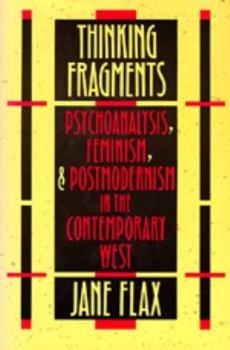Thinking Fragments: Psychoanalysis, Feminism, and Postmodernism in the Contemporary West
Select Format
Select Condition 
Book Overview
Thinking Fragments provides a brilliant critique of psychoanalytic, feminist, and postmodern theory. Examining the writings of Freud, Winnicott, Lacan, Chodorow, Irigaray, Derrida, Rorty, and Foucault, among others, Flax conducts a "conversation" among psychoanalysts, feminist thinkers, and postmodern theorists, evaluating the ways in which each group of thinkers succeeds in coming to terms with crises in contemporary Western culture. As she analyzes each theory in turn, the others are used to identify and interrogate its gaps and omissions. The result is a postmodern text of intertwined ideas, devoid of clear beginnings, endings, conclusions.
Flax addresses the question, "how is it possible to theorize in the contemporary West?" With the demise of objective notions of truth, knowledge, self and power, intellectuals have devised these new modes of thinking which both reflect and contribute to the uncertainties of the contemporary West. Each also addresses at least one aspect of what has become most problematic to modern individuals: How to come to terms with self, gender, knowledge and power without resorting to concepts that stress objectivity, universal knowledge, and a unitary self.
Flax finds that neither psychoanalysis, nor feminism, nor postmodernism is adequate to the task for which it was conceived. Each can illuminate certain aspects of problems of self, gender, knowledge, and power, but none is sufficient on its own. In fact, each incorporates characteristic blindnesses rooted in part in the very difficulties it addresses. Despite their failures, Flax concludes that these modes of theorizing are our best tools thus far, compelling us to use them even while we grapple with the problems they raise.
Thinking Fragments is a wide-ranging study that will elicit much discussion and debate. It is an essential text for social scientists and humanists alike, as well as anyone else who thinks about how to "do" theory in the contemporary West.
Flax addresses the question, "how is it possible to theorize in the contemporary West?" With the demise of objective notions of truth, knowledge, self and power, intellectuals have devised these new modes of thinking which both reflect and contribute to the uncertainties of the contemporary West. Each also addresses at least one aspect of what has become most problematic to modern individuals: How to come to terms with self, gender, knowledge and power without resorting to concepts that stress objectivity, universal knowledge, and a unitary self.
Flax finds that neither psychoanalysis, nor feminism, nor postmodernism is adequate to the task for which it was conceived. Each can illuminate certain aspects of problems of self, gender, knowledge, and power, but none is sufficient on its own. In fact, each incorporates characteristic blindnesses rooted in part in the very difficulties it addresses. Despite their failures, Flax concludes that these modes of theorizing are our best tools thus far, compelling us to use them even while we grapple with the problems they raise.
Thinking Fragments is a wide-ranging study that will elicit much discussion and debate. It is an essential text for social scientists and humanists alike, as well as anyone else who thinks about how to "do" theory in the contemporary West.
Format:Paperback
Language:English
ISBN:0520073053
ISBN13:9780520073050
Release Date:December 1990
Publisher:University of California Press
Length:287 Pages
Weight:0.95 lbs.
Dimensions:9.0" x 0.8" x 6.0"
Related Subjects
Gay & Lesbian Health, Fitness & Dieting Health, Fitness & Dieting History Internal Medicine Medical Medical Books Medicine Modern (16th-21st Centuries) Nonfiction Philosophy Politics & Government Politics & Social Sciences Psychology Psychology & Counseling Psychotherapy, TA & NLP Social Science Social SciencesCustomer Reviews
1 rating
"Thinking Fragments" is not fragmented thinking
Published by Thriftbooks.com User , 15 years ago
It is always interesting to read discussions on postmodernist philosophy. It seems similar to reading a book about the failure of language to communicate information accurately - the project appears to fail before it gets off the ground. However, I believe Jane Flax does an admirable job providing someone who is admittedly a non-potsmodernist with what I believe to be an accurate snapshot of the status of postmodernism as best as perhaps it can be understood. She provides a nice (non-postmodernist) summary of postmodernism in her opening chapter. She argues that postmodernism is already replacing modernist thought and philosophy whether we realize it or not, and, whether we desire it or not. Postmodernism can be summarized as the Death of Man, the Death of History, and the Death of Metaphysics (particularly the concept of a universal and knowable Truth). The details are worth considering as you read the book. The main emphasis of the book explores how each proponent of psychoanalysis, feminism and postmodernism might understand the other two. This may be in fact the "a best" way to understand these topics. The title is correct from a postmodernist's viewpoint because, from that viewpoint, there is no overarching epistemology that can be known, only local "understandings" that result from local discussions - fragments perhaps of a larger unknowable something. Fragments are smaller and safer, lacking any power to force unification and therefore control over others. If she is correct, then one wonders if Alasdair MacIntyre is correct at the close of his book "After Virtue". He likens the present period as similar to the time immediately preceding the Fall of the Roman Empire when "men and women of good will turned aside from the task of shoring up the Roman imperium" and instead began "the construction of new forms of community within which the moral life could be sustained", so that virtues and knowledge could survive the last dark ages. Are we really entering a new "fragmented" dark ages?






